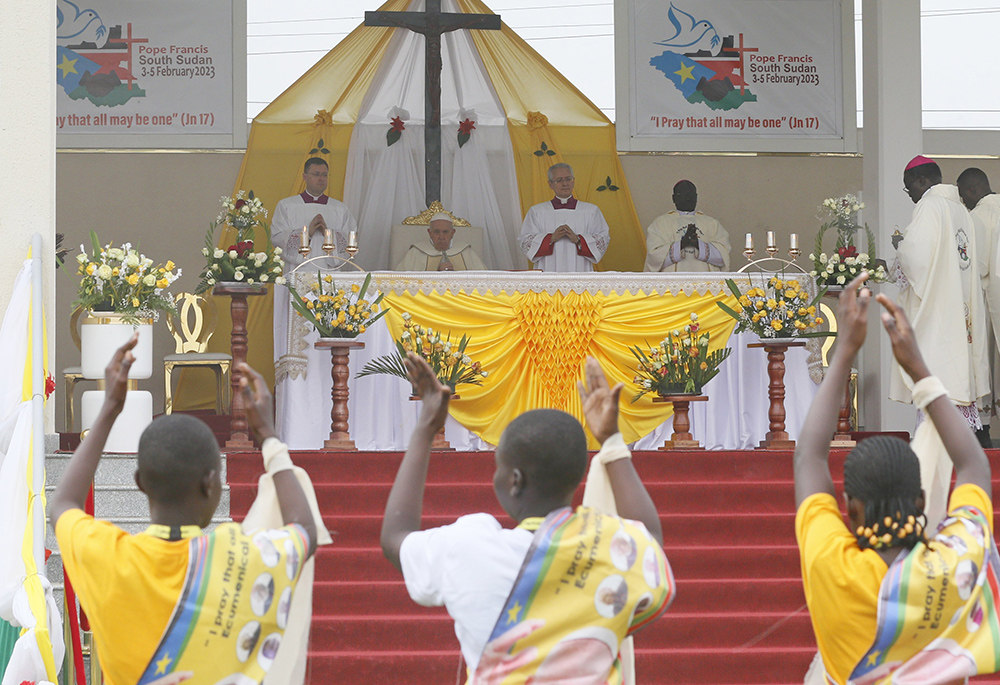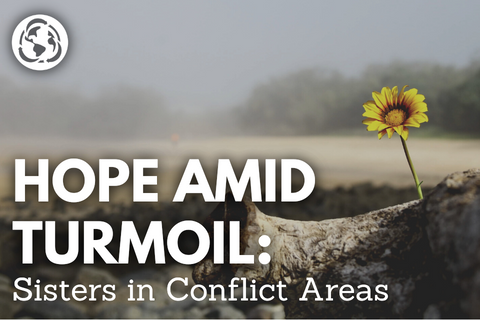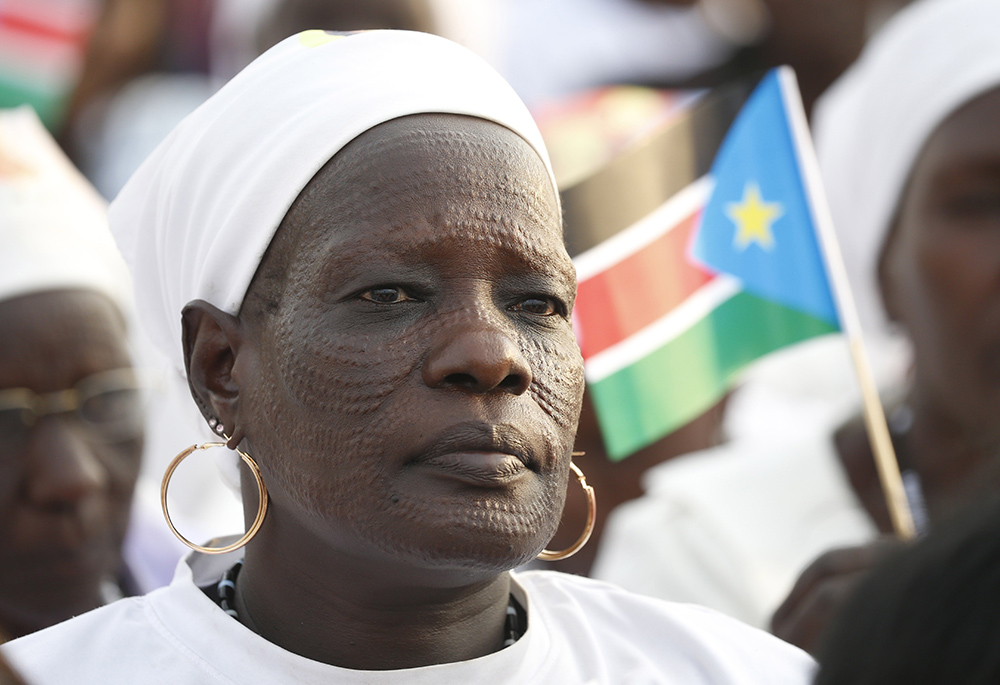
Dancers perform as Pope Francis begins the celebration of Mass at the John Garang Mausoleum Feb. 5 in Juba, South Sudan. (CNS/Paul Haring)
"Lord, make me an instrument of thy peace. Where there is hatred, let me sow love. … Where there is despair, hope."
—"Prayer of St. Francis"
South Sudan is the world's youngest country, which just gained its independence in 2011. Despite its oil wealth and fertile land, the country suffers from a low gross domestic product and is rated as one of the poorest countries in the world. Since 2013, the young country has been ravaged by political and ethnic conflicts, leaving its people facing one of the gravest humanitarian crises in the region that rarely makes headlines. As a result of these constant politically and ethnically motivated conflicts, thousands of South Sudanese today live as refugees in camps for internally displaced persons within the country as well as in the neighboring countries. More than 2 million South Sudanese have been displaced.

It is important to note that Christianity is the country's major religion, with about 61% of the population affiliated with the Catholic, Episcopal and Presbyterian churches.
At the Good Shepherd Peace Centre, or GSPC, in Kit, we run a hospitality center where different groups of people come to hold various programs in, for example: trauma healing, formators' forum, assemblies, retreats, and training sessions for staff, all within a peaceful environment that the GSPC exists to offer.
I arrived at GSPC in Kit, on Sept. 29, 2022, and from Nov. 13-19, the center hosted the diocesan assembly of the Diocese of Malakal. The assembly couldn't be in Malakal because of fighting in the area, and the bishop had to transport 80 members — priests, sisters, catechists and the laity — to Kit where they could hold their assembly in peace.
At the Religious Superiors Association of South Sudan Assembly that also took place here, last year, 2022, I saw that these courageous men and women religious — working mostly with people at the grassroots — were so discouraged about any possibility of change in the government and in the lives of the people. People are being killed, maimed, raped, made homeless as they move around the country trying to dodge the ever-shifting mosaic of vengeful violence.
Friends have asked me what the local church has done since the pope's 2019 meeting with President Salva Kiir and politicians of South Sudan. Francis invited the president and vice presidents to the Vatican for a retreat, ending it with a powerful gesture of kissing their feet and begging for peace.
I imagine the people of South Sudan hoped that the local church would have worked harder on following up on the pope's dramatic gesture. Either not much was done, or their efforts were frustrated. So people on the ground never felt much impact from that Vatican intervention, and the feelings of disillusionment, hopelessness and abandonment — by the government and the church — are always very obvious when we talk with people.
Every Christian should be feeding this fire of peace that the pope has ignited. We are praying that local church leaders, elders and traditional rulers respectfully come together and start working with the government — forgetting political differences — to correct corrupt government systems and stop the violence and killings that happen unchecked every day. Only in this way will justice and peace be restored again in this land.
Advertisement
The historic visit of Pope Francis (Feb. 3-5) — with the archbishop of Canterbury and the moderator of the Presbyterian Church of Scotland — is a strong statement to this young country that Christians worldwide stand solidly with them in their struggles against political or ethnic conflicts, corruption, injustices of all kinds, and violence, particularly violence against women and the untold suffering of many living as refugees, far away from their farmlands, far away from their relatives and family.
The visit was a great moment of witnessing to the fact that God loves and cares for all his people. God never abandons his own, confirming the Indian proverb: When we take one step towards God, He takes seven steps towards us!
That Saturday, as the pope, the archbishop of Canterbury and the moderator arrived at the jam-packed stadium, the two biblical story scenes that came to mind were the visitation of Elizabeth by Mary and the Presentation of Jesus in the Temple. Just like the child leapt for joy in Elizabeth's womb at the sound of Mary's greetings, so there was a thunderous and joyful outburst of songs of welcome, interspersed with high-pitched ululations, dancing and waving of the Vatican flag and their national flag. The visit had brought the country (in the words of Joyce Rupp) a present of presence, a presence that brings renewed hope and belief in the never-ending love, care, faithfulness, companionship and compassion of God, the Father of us all.
The visit was a strong reminder to us of something Nelson Mandela said:
Our human compassion binds us the one to the other, not in pity or patronizingly, but as human beings who have learnt how to turn our common suffering into hope for the future.

A woman waits for the start of Pope Francis' celebration of Mass at the John Garang Mausoleum in Feb. 5 in Juba, South Sudan. (CNS/Paul Haring)
The epoch-making visit was also a clear lesson for us all that conflicts, gun battles and shows of force can never restore absolute peace among any warring groups. Only nonviolence is the supreme law of life! It takes courage, strength to forgive, humility, obedience and great maturity, and done in the spirit of justice and with a renewed sense of solidarity and care for one another.
In prayer and through his speeches, the pope urged the spirit of the words of Nelson Mandela: "We owe our children, the most vulnerable citizens in our society, a life free from violence and fear."
And with emotion in his voice, the pope called for a "battle against corruption," for "no more bloodshed, no more conflicts, no more violence and mutual recriminations." "Enough!" he cried.
The pope warned that the "sons and daughters of South Sudan," and "history itself, will remember you if you work for the benefit of this people that you have been called to serve. Future generations will either venerate your names or cancel their memory, based on what you now do."
This visit by the Holy Father and the leaders of other churches was indeed a clarion call to both the government and people of South Sudan to wake up to this moment of grace as Christians.
At the end of the closing Mass, the Holy Father commended South Sudan into the loving care and protection of our Blessed Mother Mary, the Queen of Peace, and he referenced St. Josephine Bakhita, a South Sudanese saint, who herself was kidnapped and sold into slavery. Today, as a woman of great hope and faith in God, she is the patron saint for victims of slavery and human trafficking. He urged us to continue to pray unceasingly to Mary as we walk together on South Sudan's path towards healing, recovery and a sustainable peace!





